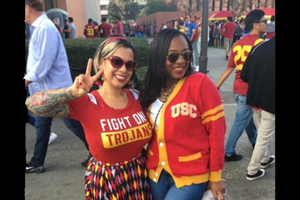
Two EdD candidates at the University of Southern California (USC) are researching how women of color, specifically Black and Latina women, manage workplace microaggressions.
Soraira Urquiza, Registrar at the American Film Institute Conservatory, and Dominique Lightsey, Educational Consultant, are working on parallel dissertations, and they will discuss their works-in-progress at this year’s AACRAO Annual Meeting.
“There are a lot of connections between these [Black and Latina] populations, a feeling like we can’t be our whole selves in the workplace,” Urquiza said. “Although there’s a lot of research on women of color faculty, we
found there was very little on the administrative side.”
Their work is an effort to address that gap, and to discover and share strategies for handling workplace bias. Each dissertation is based on qualitative interviews with higher education professionals; Urquiza’s subjects span the U.S.; Lightsey’s
are based at USC.
What are microaggressions?
Microaggressions are “brief and commonplace daily verbal, behavioural, or environmental indignities, whether intentional or unintentional, that communicate hostile,
derogatory, or negative prejudicial slights and insults toward any group, particularly culturally marginalized groups.”
Questioning of credentials, “hepeating,” and “mansplaining”
are examples; you can find more examples here, here,
and here.
“In my research, all of the people I interviewed described feeling like they’re living between two worlds,” Lightsey said. “One one hand, hypervisible when you’ve done something wrong; on the other, invisible when you
have ideas or advice.”
Overinterpretation and clarification
The daily reality of living with microaggressions can be exhausting and uncertain. Did they just say that? Did that mean what I think it meant? And as black and Latina women in middle management work toward positions of more power, they have to also
do the difficult mental work of reconciling these workplace indignities.
“One of the things that stood out to me was many women have to have a sidebar conversation after the experience, to share it with someone to ask if they were overreacting,” Lightsey said. “They’re trying to manage how angry
they should get, while also facing the ‘angry black woman’ stereotype. My advice is, if you felt like there was a microaggression experience, whether a supervisor or colleague, just turn that back onto the person perpetrating and ask
clarifying questions: What did you mean? What were you getting at? I think it makes the point for you that there’s something wrong here.”
For both Lightsey and Urquiza, that’s one of the reasons this research is so important--to validate these experiences, as well as offer best practices for navigating them.
“We hope this work will serve as a resource for women, and a reminder they are not alone” Urquiza said. “The overarching message is: Lift as you climb.”